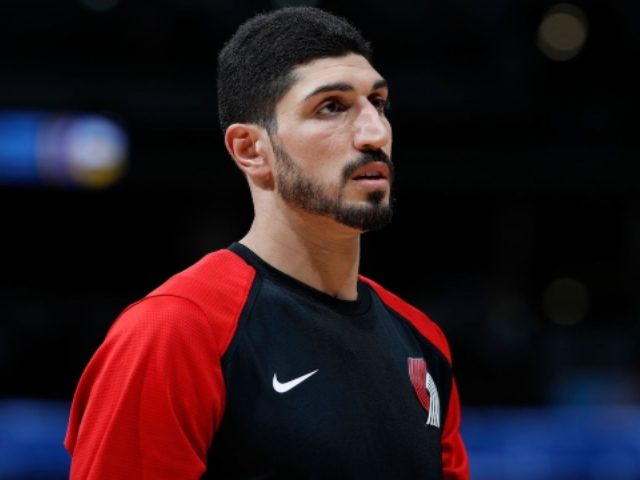If the Portland Trail Blazers manage to battle back to defeat the mighty Golden State Warriors and reach the NBA Finals, there is a good chance that Enes Kanter will have had something to do with it.
But the real battle may only just have begun for the towering Turkish star if the Blazers end up facing the Toronto Raptors when the finals get under way on May 30.
If the Blazers are required to travel to Canada for the finals, Kanter could be left behind by his team, a victim of an unprecedented sporting diplomatic crisis.
Admittedly, a lot still needs to happen for that eventuality to unfold.
Portland’s 114-111 defeat to Golden State on Thursday leaves them 2-0 down in the best-of-seven series. Toronto, meanwhile, are by no means certain to navigate their Eastern Conference finals meeting with the Milwaukee Bucks.
But the prospect of Kanter being frozen out of the biggest game of his life for geopolitical reasons is real enough that the issue has already been raised with the Canadian government by a US senator.
The reasons for Kanter’s possible exclusion are linked to his criticism of the Turkish government.
Since 2017, Kanter has effectively been stateless, after the government in Ankara revoked his passport.
The 26-year-old refuses to travel outside the United States, fearing he may be targeted by the Turkish secret service or extradited to Turkey.
– Interpol arrest warrant –
In basketball-mad Turkey, Kanter is regarded by President Recep Tayyip Erdogan’s government as a criminal because of his support for US-based cleric Fethullah Gulen, who Ankara accuses of orchestrating a coup in 2016.
Kanter’s support for Gulen has prompted Turkish authorities to seek an Interpol “red notice” or arrest warrant, meaning he could in theory be detained if he leaves the United States.
Prosecutors in Turkey have demanded more than four years in jail for Kanter on charges of insulting Erdogan, whom the player has in the past compared to Adolf Hitler.
Kanter’s family in Turkey meanwhile has publicly distanced themselves from the player. In a letter published by the Turkish newspaper Sabah, Kanter’s father, Mehmet, who was arrested in 2017 by authorities in Turkey, disowned his son.
“I apologize to our president and the Turkish people for the shame of having such a child,” he wrote.
Turkish television has refused to broadcast NBA games involving Kanter, meaning that the ongoing series with Golden State is off the air.
Kanter, who has regularly criticised Erdogan on Twitter, has condemned his treatment in comments to journalists in the United States.
“All these NBA fans, they want to watch the Western Conference finals, but they can’t all because of me. It’s funny and crazy,” Kanter told the Washington Post. “(The Turkish government) is afraid of an NBA player.
“I’m not a politician. It’s not my job, but everyone is so scared of Erdogan that I have to step up and speak out for freedom and human rights. It shows it’s a dictatorship in Turkey.”
– Unconventional journey –
Kanter’s route to the NBA was unconventional.
Born in Switzerland, where his academic father was working on a thesis, Kanter grew up in Turkey and was soon playing for Fenerbahce, one of the powerhouses of Turkish basketball.
He moved to the United States at the age of 17, going to school in California where his talent was soon spotted by the top college basketball programs.
Although several colleges scrambled to recruit him, with the Kentucky Wildcats appearing to win the race for his signature, the NCAA, which oversees college sport, deemed him ineligible to play college basketball because of some $30,000 he had already earned playing for Fenerbahce.
With his college career stymied, Kanter went into the 2011 draft where he was chosen with the third overall pick by the Utah Jazz.
After four seasons in Salt Lake City (2011-15), two in Oklahoma City (2015-17) and one and a half in New York (2017-19), Kanter joined Portland in February this year, where has played a key role in helping the team reach the Western Conference finals.
His performances in the playoffs have been complicated by the fact that the postseason coincides with the Muslim holy month of Ramadan, which is marked by fasting from sunrise to sunset. Ramadan also means Kanter is unable to take medication to relieve shoulder pain for most of the day.
“I’m not the only one to face that, millions of Muslims around the world are living this too,” Kanter said.
“I want to show that we can succeed when we have difficult challenges, whether it is fasting for Ramadan or going to the end of the NBA play-offs,” he added.

COMMENTS
Please let us know if you're having issues with commenting.